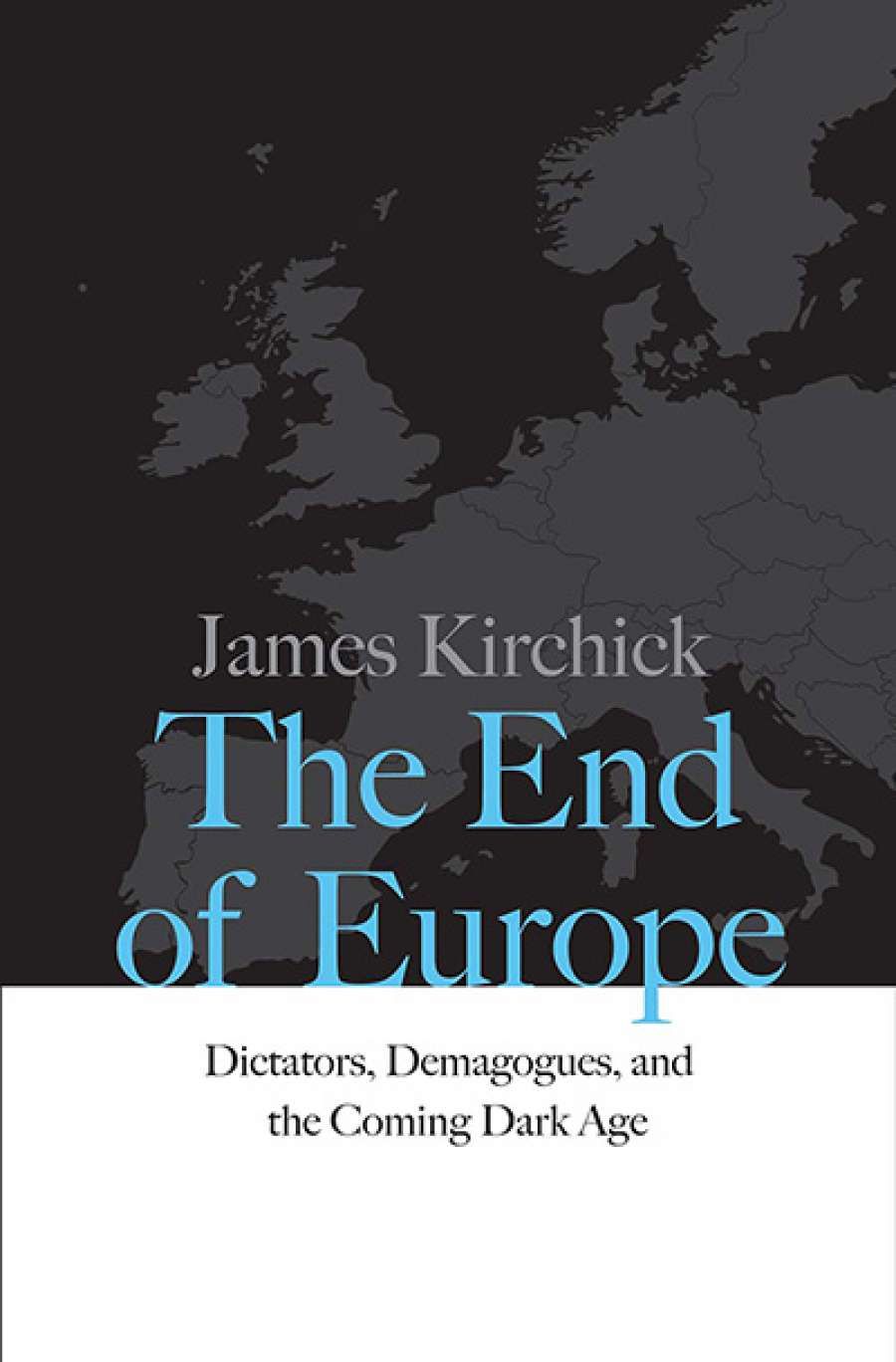
- Free Article: No
- Contents Category: Politics
- Custom Article Title: Colin Wight reviews 'The End of Europe: Dictators, demagogues, and the coming Dark Age' by James Kirchick
- Book 1 Title: The End of Europe
- Book 1 Subtitle: Dictators, demagogues, and the coming Dark Age
Kirchick formed his views during his time working as a journalist travelling in Eastern Europe. His analysis of the state of contemporary Europe is primarily based on geopolitical issues rather than economic concerns. In many respects, Kirchick suggests that Europe is sleepwalking into exactly the kind of enervated state desired by Vladimir Putin. The causes of this demise are economic stagnation, populism, disenchantment with liberal democracy, and rising social tensions, primarily driven by the immigration crisis, but also the rise, once again in the heart of Europe, of anti-Semitism.
None of these issues is necessarily unique to Europe, and although Kirchick claims that the problems are largely of Europe’s making, he is at pains to point out that whatever is visible in one country can spill over borders and reverberate across the continent. In addition, Europe faces external pressures and threats that only heighten the consequences of the problems it faces. A resurgent Russian nationalism is one of these, but equally problematic is the election of Donald Trump. Indeed, Kirchick sees Trump as representative of exactly the kind of European ethno-nationalist movement that Americans have always been so scathing about and that Europeans believed was behind them.
It is here, however, that the course of history makes fools of those who would dare to predict. There is no doubt that Putin and Trump represent a return to a form of hyper-nationalism, and Brexit too could be read in that way. But the trends are not all in one direction. The utter collapse of UKIP following the Brexit vote, and the failure of Marine Le Pen’s Front National in France suggest that the public’s commitment to hyper-nationalism is less a long-term trend than a sense of deep satisfaction with the economic consequences of globalisation, the global financial crisis, and the failure of economic and political élites to acknowledge these issues.
One of the problems of the far left’s analysis of the emergence of right-leaning populism has been to attribute it almost exclusively to racism and Islamophobia. But, given that Brexit and Trump collectively represent something close to 120 million people, if they are all racist then ‘Houston we have a problem’.
It would be all too easy to write off Kirkchick as some alarmist alt-right doom mongerer. No doubt the ‘regressive left’, as Maajid Nawaz, calls them will do so. But that is far too simplistic. It has become symptomatic of the contemporary ‘post-truth’ era that any attempt to provide sophisticated political analysis from a middle-ground liberalism is attacked by all.
Kirchick’s book can be read as a plea for a return to honesty. Honesty in acknowledging the problems Europe faces. Honesty in accepting what needs to be done, and quickly, before the problem is beyond our control. And honesty, in recognising the source of the problems; which is as much to do with the denial of them as it is the source of them. For according to Kirchick, it is the unwillingness of political élites and liberal publics across Europe to confront the problems that has created the far-right backlash against them. The far right gains traction not because the establishment left has it wrong but because they deny there is a problem in the first place.
 The 'Stop Trump' rally at London's Parliament Square, February 2017
The 'Stop Trump' rally at London's Parliament Square, February 2017
(photograph by Garry Knight, Wikimedia Commons)
In this respect, the crises facing Europe represent a crisis of liberalism. And this is a crisis of forgetting; in particular, the forgetting of the horrors of illiberal ideologies that generated World War II, the Holocaust, and the Gulags. And it is here, in this forgetting, that Kirchick believes the real source of Europe’s problems can be located. Hyper-nationalism, populism, economic stagnation, and the rise of anti-Semitism are simply symptoms of a deeper malaise – a malaise that extends far beyond European borders and affects the underlying logic of our commitment to liberal democracy.
As Kirchick puts it, ‘the problems described in this book have in common a loss of faith in the universal, humanistic values of what might be called the European idea’. This European idea is that of Enlightenment itself, and without this commitment to the principles of the Enlightenment, we will return to the coming Dark Age. Hence underpinning all of Europe’s problems, according to Kirchick, is the moral relativism and self-doubt that saps the West at every turn. And make no mistake, Kirchick believes that although the coming Dark Age may emerge in Europe first, it can only become a global phenomenon, the early roots of which can already be seen on the American continent with Trump’s victory.
Thus, although this well-researched, well-written, well-argued book is on the surface concerned with the potential decline of Europe, the consequences of its analysis are much broader. And it is not just the geopolitical and economic factors that we need to address, but rather, it is the demise of the underlying belief structure that we have values worth defending that represents the most dangerous aspect of the contemporary age. Americans, and perhaps the rest of the globe, can sit back and reflect with a little satisfaction that the Europeans might be about to get what they deserve. And there is some logic to this, given two wars that began in Europe but which became global in scope, not to mention European colonisation and imperialism. But if Europe is the canary in the cage, then what is killing it won’t stop there.


Comments powered by CComment